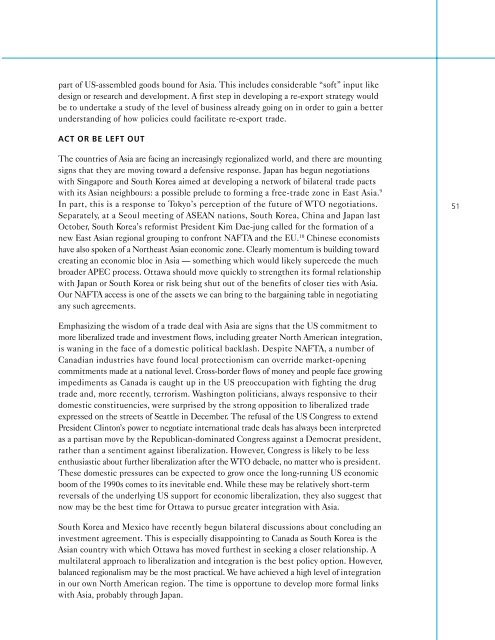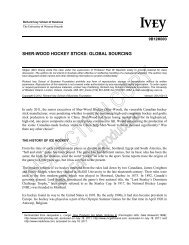foundation of canada asia pacific - Content Tagged with
foundation of canada asia pacific - Content Tagged with
foundation of canada asia pacific - Content Tagged with
You also want an ePaper? Increase the reach of your titles
YUMPU automatically turns print PDFs into web optimized ePapers that Google loves.
part <strong>of</strong> US-assembled goods bound for Asia. This includes considerable “s<strong>of</strong>t” input like<br />
design or research and development. A first step in developing a re-export strategy would<br />
be to undertake a study <strong>of</strong> the level <strong>of</strong> business already going on in order to gain a better<br />
understanding <strong>of</strong> how policies could facilitate re-export trade.<br />
ACT OR BE LEFT OUT<br />
The countries <strong>of</strong> Asia are facing an increasingly regionalized world, and there are mounting<br />
signs that they are moving toward a defensive response. Japan has begun negotiations<br />
<strong>with</strong> Singapore and South Korea aimed at developing a network <strong>of</strong> bilateral trade pacts<br />
<strong>with</strong> its Asian neighbours: a possible prelude to forming a free-trade zone in East Asia. 9<br />
In part, this is a response to Tokyo’s perception <strong>of</strong> the future <strong>of</strong> WTO negotiations.<br />
Separately, at a Seoul meeting <strong>of</strong> ASEAN nations, South Korea, China and Japan last<br />
October, South Korea’s reformist President Kim Dae-jung called for the formation <strong>of</strong> a<br />
new East Asian regional grouping to confront NAFTA and the EU. 10 Chinese economists<br />
have also spoken <strong>of</strong> a Northeast Asian economic zone. Clearly momentum is building toward<br />
creating an economic bloc in Asia — something which would likely supercede the much<br />
broader APEC process. Ottawa should move quickly to strengthen its formal relationship<br />
<strong>with</strong> Japan or South Korea or risk being shut out <strong>of</strong> the benefits <strong>of</strong> closer ties <strong>with</strong> Asia.<br />
Our NAFTA access is one <strong>of</strong> the assets we can bring to the bargaining table in negotiating<br />
any such agreements.<br />
51<br />
Emphasizing the wisdom <strong>of</strong> a trade deal <strong>with</strong> Asia are signs that the US commitment to<br />
more liberalized trade and investment flows, including greater North American integration,<br />
is waning in the face <strong>of</strong> a domestic political backlash. Despite NAFTA, a number <strong>of</strong><br />
Canadian industries have found local protectionism can override market-opening<br />
commitments made at a national level. Cross-border flows <strong>of</strong> money and people face growing<br />
impediments as Canada is caught up in the US preoccupation <strong>with</strong> fighting the drug<br />
trade and, more recently, terrorism. Washington politicians, always responsive to their<br />
domestic constituencies, were surprised by the strong opposition to liberalized trade<br />
expressed on the streets <strong>of</strong> Seattle in December. The refusal <strong>of</strong> the US Congress to extend<br />
President Clinton’s power to negotiate international trade deals has always been interpreted<br />
as a partisan move by the Republican-dominated Congress against a Democrat president,<br />
rather than a sentiment against liberalization. However, Congress is likely to be less<br />
enthusiastic about further liberalization after the WTO debacle, no matter who is president.<br />
These domestic pressures can be expected to grow once the long-running US economic<br />
boom <strong>of</strong> the 1990s comes to its inevitable end. While these may be relatively short-term<br />
reversals <strong>of</strong> the underlying US support for economic liberalization, they also suggest that<br />
now may be the best time for Ottawa to pursue greater integration <strong>with</strong> Asia.<br />
South Korea and Mexico have recently begun bilateral discussions about concluding an<br />
investment agreement. This is especially disappointing to Canada as South Korea is the<br />
Asian country <strong>with</strong> which Ottawa has moved furthest in seeking a closer relationship. A<br />
multilateral approach to liberalization and integration is the best policy option. However,<br />
balanced regionalism may be the most practical. We have achieved a high level <strong>of</strong> integration<br />
in our own North American region. The time is opportune to develop more formal links<br />
<strong>with</strong> Asia, probably through Japan.



